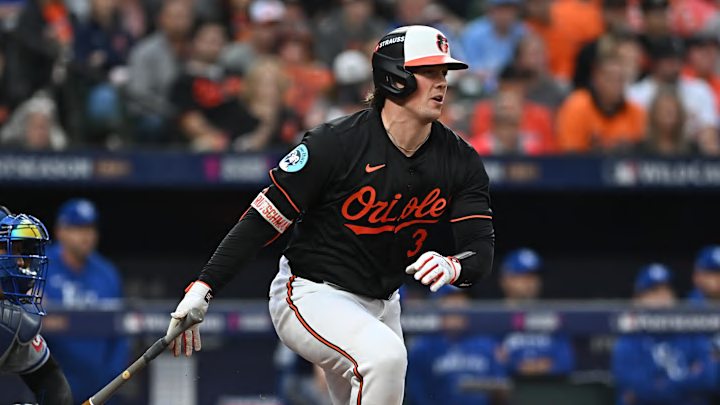Orioles’ Golden Generation Loses a Little Luster

When it was over and the Baltimore Orioles were swept out of the playoffs for the second year in a row, their unofficial captain was not interested in litigating how it had happened.
In the fifth inning of Wednesday’s Game 2 of the American League wild-card series, with the bases loaded, two outs and the score tied, the Orioles sent their franchise catcher to the plate. Adley Rutschman took two sinkers for balls. He watched a third down the middle. The next pitch was almost identical, and he swung, but late. Finally he bounced a meatball of a slider to shortstop to end the inning.
It was the best chance they would have all game. The Kansas City Royals would score an inning later to take a 2–1 lead they would not relinquish. The Royals scored just three runs this series. It was enough.
Asked afterward what he would do differently if given another shot at that fifth inning at bat, Rutschman closed his red-rimmed eyes. “I would get,” he said tersely, “A hit.”
He was right to be frustrated. Like Rutschman, this team played badly. And like Rutschman, they struggled afterward to explain why. Shortstop Gunnar Henderson, second baseman Jordan Westburg, Rutschman, left fielder Colton Cowser and backup outfielder Heston Kjerstad—the top picks from this era—combined to go 3-for-31 with two walks and a hit by pitch. After six fallow years between 2017–22 when the Orioles averaged 34½ games out of first place, this generation is supposed to bring success in October. But it’s now played five postseason games, lost them all—extending a franchise postseason losing streak to 10—and held a lead for a total of half an inning. After scoring the fourth-most runs and hitting the second-most homers in the sport this season, Baltimore’s vaunted offense scratched across one run this series.
Rustchman was hardly the only player to fall short on Wednesday, of course. There were two outs because right fielder Anthony Santander, hitting third, had popped to first, and then Cowser, hitting fourth, had struck out swinging at a pitch that hit him in the left hand. (X-rays later revealed it was broken.)
“If I just get hit by a pitch there, we take the lead,” Cowser said afterward. “It’s not a good feeling. It just sucks. That’s pretty much the only way to sum it up.”
And an inning later, when Royals shortstop Bobby Witt Jr.—picked No. 2 behind Rutschman in the 2019 draft—bounced a ball to second, Westburg might have flipped the ball to Henderson to catch the runner going to second for the final out of the inning. Instead Westburg’s throw to first arrived half a step after the speedy Witt, and the go-ahead run scored.
Afterward, Westburg said that he had believed his only play was at first. “I’m gonna be running through those moments for the next couple days,” he said.
Most of the players lamented the abruptness of the finish. “It’s a long year for it to end really quickly,” said ace Corbin Burnes, for whom the Orioles traded two top prospects this spring. He had made the playoffs five times with the Milwaukee Brewers; Baltimore wanted him for just this sort of moment, and he delivered, with eight one-run innings in Game 1. His teammates were shut out. He lingered in the dugout after the final out of Game 2, watching the Royals celebrate on the field and checking on his younger teammates.
“I’ve been through this six times now,” he said. “Some of these guys, this is their first, second time.” (“It’s getting old,” he added.) He paid special attention to Henderson and Rutschman. “A lot of the emotions they feel is because of the expectations of the organization,” Burnes said. “But they’re huge reasons why we made it this far.”
Burnes and Santander will be free agents this winter. Rutschman, who made close to the league minimum of $740,000 this year, will become eligible for salary arbitration for the first time; MLB Trade Rumors, which generally does a good job at this sort of thing, projects him to make $5.8 million next year. Former owners Peter Angelos and his son John shied away from spending: John told The New York Times last year that extending their young players would leave them “so financially underwater that you’d have to raise the [ticket] prices massively.” Five months later, financier David Rubenstein bought the team for $1.725 billion. He has not publicly discussed his budget. It’s possible that five-man core will be gone once the players become too expensive.
In the meantime, they have to hit. Rutschman referred a few times to the idea that he would “let [his] body get right” in the offseason but insisted he was not injured. Cowser mulled the question of whether the series came down to good pitching or bad hitting.
“I’m not going to discredit them at all,” he said. “They definitely came out and they did what they were supposed to do. I feel like we could have strung together a couple ABs in a row, and, you know, we started to do that. Just kind of missed a big hit. And I think that as a whole—I wouldn’t say we beat ourselves, but we just didn't come through.”
They will have to figure out why if they are to avoid this fate yet again. Baltimore’s window of contention is still open. But every missed opportunity nudges it another inch or two closed.
